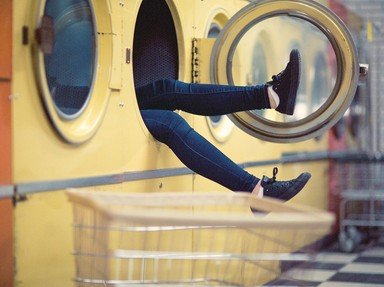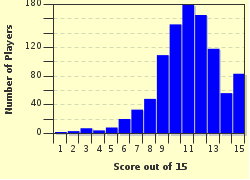Quiz Answer Key and Fun Facts
1. "Oops, I guess I should have checked that..."
In 2005, McDonald's unveiled a new marketing slogan. Apparently, some advertising people had heard a particular phrase and decided it meant "I want that." It actually does, but only in the sense of "I want to have sex with that [person]." McDonald's therefore unveiled a campaign which suggested they catered to people who want to have sex with food. What phrase should they have checked before putting it on billboards?
2. "Oops, I think I spilled something..."
In London in 1814, nine people were killed when a huge container failed. The rupture of that vat caused other vats to fail. The net result was a flood of approximately 376,018 US Gallons (or 1,470,000 liters) of a fluid. Many people would be thrilled by a flood of this fluid, but this was definitely too much of a good thing. What was it?
3. "Oops, I guess I kinda mixed up the priorities..."
In 1991, there was a fire at a chicken processing plant in Hamlet, North Carolina. Twenty-five people died and fifty-four were injured. The key reason for the deaths would have been discovered had the plant ever been the subject of a safety inspection, but no one had ever conducted one. What obvious safety hazard should have been corrected?
4. "Oops, maybe I should have proofread that..."
In 1999, the Mars Climate Orbiter failed to enter Mars orbit at the correct altitude, resulting in the loss of the unmanned spacecraft. Analysis of the failure led to the revelation that someone had messed up the math. What was the miscommunication that resulted in the loss of a significant element of a $327 million-dollar project?
5. "Oops, that probably wasn't the best plan..."
In World War II, a lot of bizarre weapons showed up. Some of 'em were successful. One that was not was the Soviet Union's attempt to train dogs to blow up tanks. Basically, they strapped bombs to dogs, trained them to run under tanks, and then let them loose on the battlefield. What led to the failure of the program?
6. "Oops. I forgot to check the map..."
In 1844, the United States Government began construction on Fort Montgomery, intended to protect the citizens of the United States from the Canadian hordes. (Although I doubt there was really all that much concern, since the fort wasn't completed until 1871.) However, the 1844 fort wasn't the first one. One was begun in 1816, but was never completed because someone messed up. What was the embarrassing mistake?
7. "Oops. I think we jumped the gun on that one..."
One of the great blunders in American journalism occurred in 1948. The Chicago Tribune, under deadline pressure and based on the analysis of experienced political commentators, pollsters, and (probably) wishful thinking, published an edition with a banner headline announcing the wrong result. What was the headline?
8. "Oops. I forgot that reporters shouldn't do that..."
In 1981, Janet Cooke, a reporter for the Washington Post, won the Pulitzer Prize for an article entitled "Jimmy's World." "Jimmy's World" described the life of an eight year old heroin addict. Unfortunately, the Post returned the prize three days later, and Ms. Cooke resigns due to her breach of journalistic ethics. What had she done?
9. "Oops, maybe that was kinda important..."
In 2004, the "Herald-Leader," the newspaper in Lexington, Kentucky issued a formal apology because the two newspapers which merged to become the "Herald-Leader" had consigned coverage of one of the major changes in American culture to brief notes in a column called "Colored Notes." What movement had the paper "neglected to cover?"
10. "Oops. I guess we shouldn't have said that..."
In 1919, American rocket scientist Robert H. Goddard published a short book called "A Method of Reaching Extreme Altitudes." His conclusions were widely mocked by the general public, including the "New York Times." The "Times" was especially irritated by Goddard's assertion that a rocket could escape the earth's atmosphere and travel to the moon. According to the "Times'" scathing editorial, Goddard "...only seems to lack the knowledge ladled out daily in high schools." The "Times" finally got around to apologizing to Goddard on July 17, 1969, the day after the launch of Apollo 11. What principle had the "Times" finally accepted?
11. "Oops. Maybe we should have checked for that..."
The "biggest medical tragedy of modern times," according to a BBC programme, concerns a drug called "Thalidomide." Thalidomide is "an effective tranquilizer and painkiller," but it can cause birth defects, most visibly in the form of shortened or absent limbs. In other words, if a pregnant woman takes the drug, the child may be born with malformed or absent arms or legs. This problem was made far worse because Thalidomide was specifically prescribed to pregnant women to help them with what pregnancy-related problem?
12. "Oops. Maybe we should have hired different guys..."
In 1990, the duo of Fab Morvan and Rob Pilatus, known as Milli Vanilli, were forced to return their Best New Artist Grammy. They were also sued by their fans. What heinous sin had they committed?
13. "Oops. You think maybe we should change the requirements?"
Marie Curie is on the short list for most awesome scientist of all time. She won a shared Nobel Prize for Physics in 1903, and a second, for Chemistry, in 1911. Not only does that make her the first woman to win a Prize, but she's also the first person to win two in different scientific disciplines. One would think that she'd have been a member of every prestigious scientific community available, but she wasn't. Specifically, she was excluded from the French Academy of the Sciences. Why?
14. "Oops. Maybe I should have looked at the publication date..."
You know how it is - you're a struggling artist, and suddenly you turn on the TV or radio, and some so-and-so is making a bunch of money by copying your work. Sometimes, this is an inadvertent use (oops!) and everyone reaches an agreement. Sometimes you have to sue the thieving so-and-so. Of course, sometimes the so-and-so's the one with the original idea, and the plaintiff is just trying to make a quick buck. Which one of these works was held to be original with the rich so-and-so? (In other words, the person who claimed they'd been ripped off LOST.)
15. "Oops. Butterfingers..."
During the Manhattan Project (the Allies' effort to make an atomic bomb in World War II), the scientists weren't sure about some things. One of those things was whether the explosion would ignite the atmosphere and incinerate all life on Earth. (They were pretty sure it wouldn't, but Edward Teller offered to take bets on whether it would.) But on August 21, 1945, Harry K. Daghlian, Jr. died as a result of a rather significant mistake. What was it?
Source: Author
Correspondguy
This quiz was reviewed by FunTrivia editor
trident before going online.
Any errors found in FunTrivia content are routinely corrected through our feedback system.

